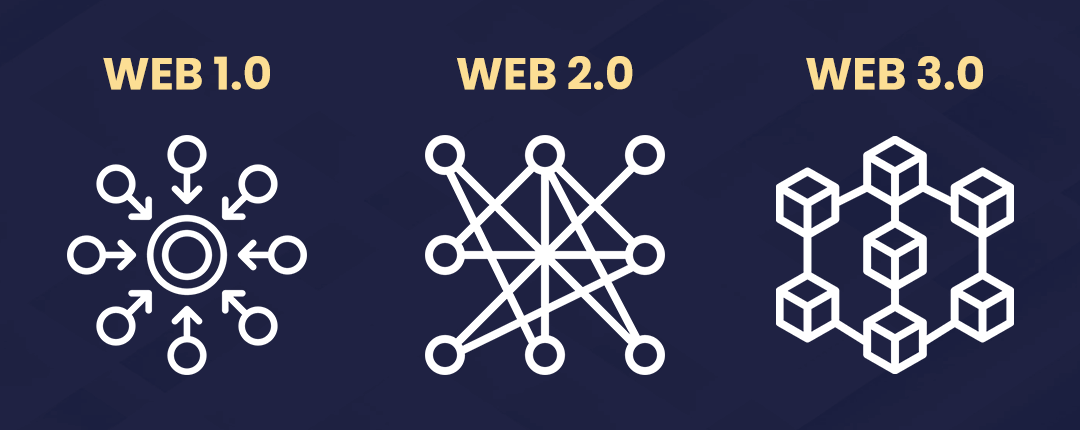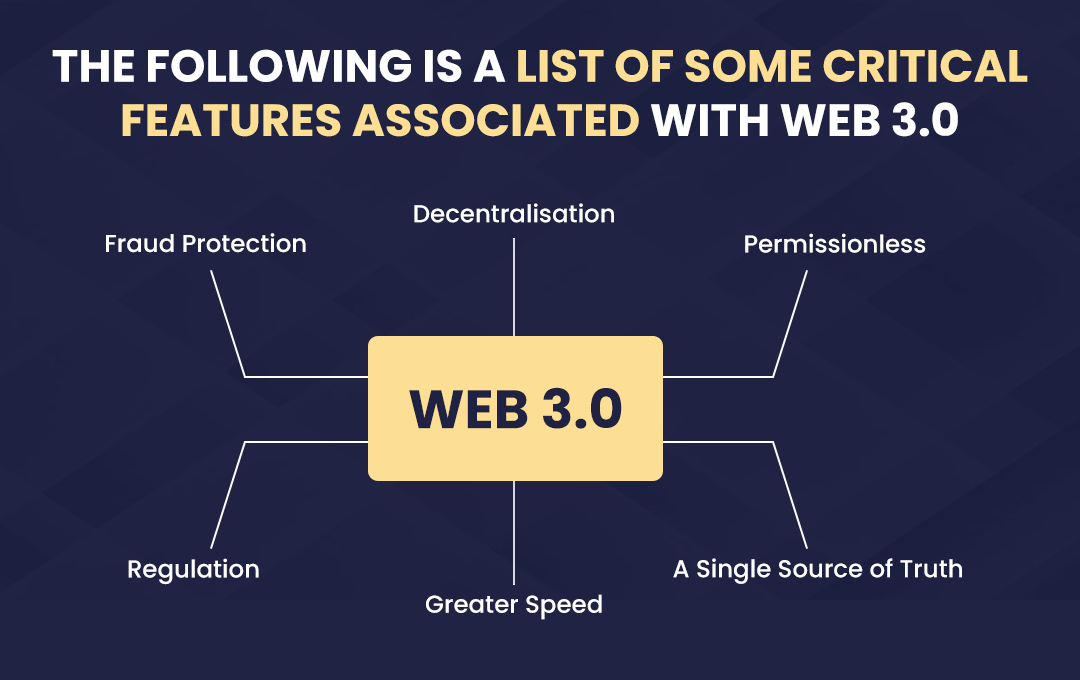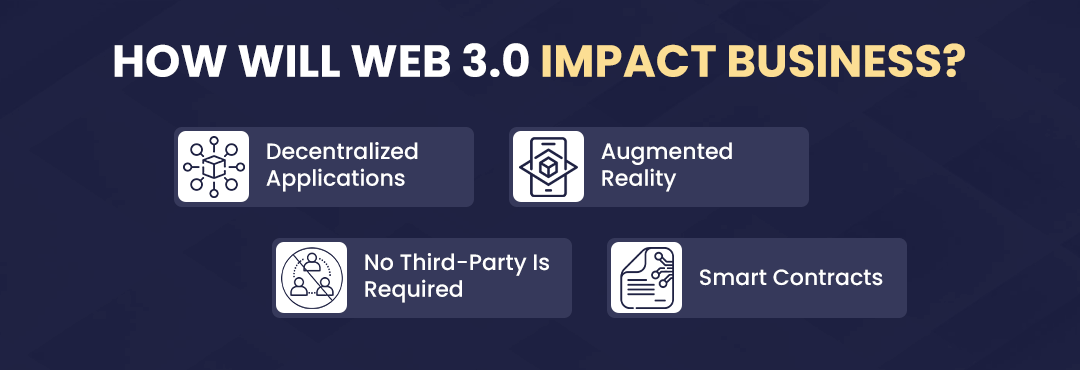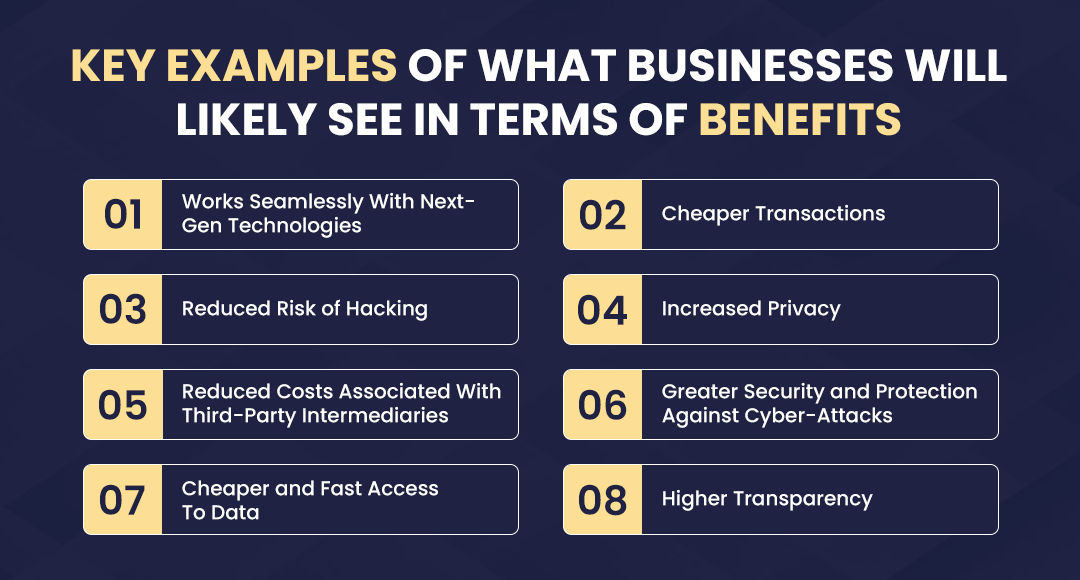Web 3.0 is a term that refers to the third generation of the internet, which includes innovations such as decentralized applications, distributed ledgers (blockchain technology), and smart contracts. The implications of Web 3.0 for businesses are enormous — it has the potential to transform how business functions in general by fundamentally altering how value is created and transferred online.
In this blog post, we explore everything you need to know about what Web 3.0 is and why it matters for your business: What makes it different from earlier generations, its impact on finance & money, and how decentralized apps are likely to change online retail, what challenges may be faced during implementation of Web 3. If you want to leverage this technology, hire the best Web 3.0 developers.
Let’s start by understanding the history of the Web.
History of Web

1. Web 1.0
Web 1.0 is also referred to as Internet 1.0 or the Client/Server model, which utilizes centralized information storage and is based on the client-server model. Web 1.0 was during the late 80s to 90s when most websites were informational in nature and used the Hyper Text Transfer Protocol (HTTP) to link documents that could be downloaded by browser software like Netscape Navigator and Internet Explorer.
2. Web 2.0
Web 2.0 took things to the next level, with faster internet connections and browsers like Google Chrome making information sharing easier than ever before — it enabled real-time interactions between users, made crowdfunding possible, brought about a sharing economy where services were rendered on demand, and introduced video streaming services such as Youtube.
3. Web 3.0
Web 3.0 is the third generation and allows for decentralized applications (DAPPs), smart contracts, distributed ledgers, and augmented reality applications to be created on the web — it will enable businesses to develop innovative business models that could be made impossible in a world of centralized applications, transaction fees and other costs associated with traditional blockchain technology such as Ethereum (ETH) blockchains.
Businesses’ need for Web 3.0 is clear; both large and small businesses will be able to reap the benefits of Web 3.0, whether that be through the ability to create decentralized applications or through the potential to use smart contracts.
Web 3.0 architecture
Blockchain technology — which underlies Web 2.0 applications such as DAPPs — has been described as “an enormously powerful new kind of internet infrastructure.”
As a result, many business professionals are now beginning to view Web 3.0 technology as the future of enterprise-level computing and blockchain technology as a critical component of web 3.0 architecture.
The following is a list of some critical features associated with Web 3.0

1. Decentralisation: Data is stored on the Blockchain
Web 3.0 technology will make it possible for businesses to store and access blockchain data without needing third-party intermediaries. Companies can tap into a larger repository of information than what is available to companies using traditional online payment systems.
2. Permissionless: No Access Restrictions
This means that no permission is needed to join or participate in Web 3.0 systems, meaning that anybody can interact with the infrastructure regardless of their geographical location, work status, or financial situation.
3. A Single Source of Truth: Data Stored in the Blockchain
Since data is stored in a distributed ledger, every entry is verifiable and accessible by anyone to verify whether it has been altered and by whom — this means that businesses can be completely transparent and open about their finances.
4. Greater Speed: Instant Payments Using Smart Contracts
Since transactions using Web 3.0 are carried out directly between user-to-user, these will be a much faster and less costly payment method than the current system uses.
5. Regulation: Data Security and Compliance
Data can be stored on the blockchain in a decentralized manner, meaning that any data breaches that occur are subject to regulatory oversight — through this, businesses will be able to comply with data security requirements regardless of where their systems are located.
6. Fraud Protection: Better Accuracy and Reliability
Since the blockchain is a transparent database, this helps to minimize fraud in a variety of ways:
1. If a record is altered, it will be immediately known by any user who can verify this.
2. If users act dishonestly, they will face legal repercussions. This can prevent fraudulent behavior such as double-spending.
3. Since decentralized applications are entirely autonomous and open source, it is unlikely that user data will be hacked or stolen by malicious third parties.
How will Web 3.0 impact business?
The potential of Web 3.0 is so large that it is difficult to speculate how exactly it will impact businesses and firms; however, we can identify some key areas where it may have a significant impact:

1. Decentralized Applications
Unlike other blockchain platforms such as Bitcoin (BTC) and Ethereum (ETH), DAPPs are not controlled by a single entity. DAPPs are built using Web 3.0 and decentralized technologies that enable their decentralization, such as Ethereum’s Turing complete programming language Solidity and IPFS, a peer-to-peer file sharing protocol that runs on the Ethereum blockchain.
Examples of these applications include decentralized crowdfunding and decentralized exchanges, both of which make it easier for businesses to raise funds and trade goods without using a centralized web portal.
2. Augmented Reality
With augmented reality (AR), users are able to augment the real world with computer-generated images such as virtual buildings and cityscapes that allow users to gather more information about a location before visiting it. While, in theory, businesses might be able to use this technology for customer service by creating customer-facing AR apps, in actuality, companies will likely find more use for AR in marketing their products.
3. No Third-Party Is Required
With the rise of DAPPs, businesses are no longer required to pay for services from third parties — companies can operate entirely autonomously and exchange peer-to-peer without the need for centralized middlemen such as banks, payment processors, and other intermediaries.
4. Smart Contracts
This technology uses cryptographic algorithms that allow automated peer-to-peer exchanges of money, assets, or anything else of value to occur without a central authority. The technology has been described as “a blockchain with a brain,” allowing users to execute contracts on the blockchain — providing a smart contract solves this problem.
Here are some key examples of what businesses will likely see in terms of benefits

1. Works seamlessly with next-gen technologies
Web 3.0 works seamlessly with next-generation technologies such as 5G BYOD (Bring Your Own Device) and IoT, allowing businesses to create applications that can run on any device — smartphones, tablets, AR glasses, and so on.
2. Cheaper Transactions
Businesses that use EOS tokens or other cryptocurrencies will be able to conduct transactions with customers at a far cheaper rate than what is currently possible using the traditional online payment system — which charges upwards of 3% per transaction.
3. Reduced Risk of Hacking or Cyber-Attacks on Individual Businesses or Enterprises
Most businesses are susceptible to cyber-attacks and data breaches, which can cost them millions of dollars in terms of customer data loss. However, with decentralized applications, businesses will have the added benefit of security as these apps are built in such a way that an attacker cannot gain access to the business’ data or infrastructure.
4. Increased Privacy
As monetization is not dependent on central authorities like banks and payment processors, companies that use DAPPs will enjoy greater levels of privacy than they would otherwise — no user information is required for companies to accept cryptocurrency or operate as a decentralized application.
5. Reduced Costs Associated with Third-Party Intermediaries
With Web 3.0 technology, businesses will be able to run their own decentralized application without the need to have an intermediary such as a bank or payment processor — this will reduce costs associated with third-party intermediaries such as banks that can charge upwards of 3–5% in transaction fees.
6. Greater Security and Protection Against Cyber-Attacks
With decentralized apps, businesses can operate with greater security than they are currently able because they are no longer reliant on forums or depositories — this means that cyber-criminals and other hackers cannot access their business infrastructure.
7. Cheaper and Fast Access to Data
With Web 3.0, businesses will be able to access and use data that is stored on the blockchain at a much cheaper rate than other traditional payment systems and infrastructure — businesses will be able to engage with their customers more efficiently and cheaply as they can pay for advertising and other services using cryptocurrency directly from their businesses’ wallets.
8. Higher Transparency
Businesses can publish information in real-time via a blockchain ledger or ledger — in turn, and this will give public knowledge of a company’s financial health far more transparency than traditional technology offers. This means that consumers are more likely to know where and how their funds were produced, where it was transported, and what steps were taken before they reached them.
To leverage these benefits, you need to hire the best Web 3.0 development company, a technology expert in custom Web 3.0 development services that can help your business.
How can we help you take advantage of Web 3.0 for your business?
As a top Web 3.0 development agency, our team of experts can help you to develop a new DAPP for your company and deploy it on the new decentralized exchange. We build blockchains, smart contracts, decentralized apps, and other Web 3.0 features from scratch. In addition, our web developers offer bespoke Web 3.0 solutions to address specific industry requirements.
Whether you are planning a new start-up, updating an existing business, or building an entirely new web app to run on web 3.0, we can deliver the solution that works for your company.
Conclusion
Web 3.0 technology will be revolutionary for today’s businesses, and blockchain-powered Web 3.0 will be a game-changer for tomorrow’s tech professionals and business owners, who are looking to take full advantage of this new tech and future-proof themselves against any form of technological disruption. As a business professional, if you don’t have the right tools or technology strategy in place and you find yourself struggling with maintaining or growing your company, then now’s the time to ask yourself where you should be positioning your company — in the future, it will all come down to what “Web 3.0” means for your company’s growth and opportunities.
Contact us today to get our Web 3.0 development services or if you need guidance on a Web 3.0 architecture for your organization.
Frequently Asked Questions
-
1. How secure are web 3.0 and blockchain?
With Web 3.0, data is stored on the blockchain in a decentralized manner, meaning that any data breaches that occur are subject to regulatory oversight — through this, businesses will be able to comply with data security requirements regardless of where their systems are located.
-
2. What are the benefits of using Web 3.0?
Web 3.0 works by blending the best elements of web and blockchain technologies. It combines Web 2.0 — user-friendly design, transparency, clarity, and ease of use — with blockchain technology, which underlies Web 3.0 applications such as DAPPs.
-
3. Can Web 3.0 be applied to other industries?
Web 3.0 technology can be applied to a variety of industries, including finance, medicine, manufacturing retail, and many more. This will benefit businesses in a number of different ways:
For example, by deploying the Ethereum blockchain on an online marketplace, sellers can engage directly with customers and provide them with real-time status updates that show the progress of their orders along with proof of delivery.
This adoption will also make it possible for businesses to keep track of their production levels more closely than ever before and provide a more streamlined way for them to communicate with customers.
-
4. Where can i get more information?
For more details feel free to contact us at admin@auxanoglobalservices.com or 1.209.736.5046.

![What is Web 3.0 & How Does It Benefits Businesses? [Complete Guide]](https://www.auxanoglobalservices.com/agsresources/wp-content/uploads/2022/08/Web-3.0-How-Does-It-Benefits-Businesses.webp)

![How to Create your own NFT Auction Portal? [2022]](https://www.auxanoglobalservices.com/agsresources/wp-content/uploads/2022/06/How-to-Create-your-own-NFT-Auction-Portal.png)
![Develop NFT-Based "Play-to-Earn" Games Using Unreal Engine [2022]](https://www.auxanoglobalservices.com/agsresources/wp-content/uploads/2022/05/Develop-NFT-Based-Play-to-Earn-Games-Using-Unreal-Engine.jpg)
